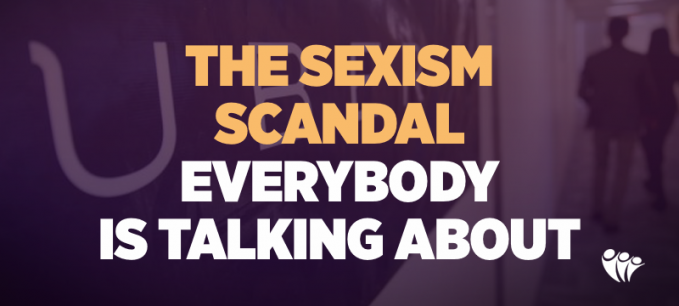The Sexism Case Everybody is Talking About

Everybody is talking about Uber, but this time not as the poster child for digital disruption. The $70 billion ride-sharing company has come under intense public scrutiny in recent weeks amid claims of a toxic culture rife with sexism and sexual harassment.
How It Unfolded
It began with a blog post by a former Uber software engineer that went viral on Twitter.
In the nearly 3,000-word post (Reflecting On One Very, Very Strange Year At Uber), Susan Fowler Rigetti describes a “Game of Thrones”-like culture; one in which she experienced multiple instances of discrimination and sexual harassment (beginning with being sexually propositioned by her manager on her first official day); spoke to other women who shared similar stories; had her claims shrugged off by HR despite diligent record keeping (in her account, both HR and management are accused of lying to protect high performers); had her career trajectory impacted as a result; and watched female numbers fall from 25% to less than 6% in her part of the organisation. In all, it paints a picture of mass female exodus from Uber due to a combination of organisational chaos and rampant, unpoliced sexism.
In response, Travis Kalanick (Uber Co-Founder/CEO) promised to launch an urgent investigation led by Eric Holder (former U.S. Attorney General with ties to Uber), Liane Hornsey (Uber’s new head of HR), and Arianna Huffington (Uber board member).
The response was welcomed by some but criticised by others, including two early Uber investors who wrote an open letter expressing their disappointment in seeing that “a team of insiders” had been selected to conduct the investigation, noting their own frustrated attempts to quietly change the “destructive culture” from within.
A few days after the Rigetti post, Kalanick held a 90-minute “emotional meeting” with more than 100 female engineers to address the allegations and listen to concerns. In an audio recording obtained by BuzzFeed, one woman is heard saying that each and every woman in the room believed the problem at the company was “systemic” and the “elephant in the room” needed to be addressed. Kalanick is heard making a commitment to aggressively root out injustice, while trying to be as supportive and empathetic as possible.
Damage (Un)Controlled
Providing further evidence of a serious problem at Uber, The New York Times released an article based on interviews with more than 30 current and former employees, which outlines an unrestrained “frat like” working environment full of bad behaviour—sexist but also generally discriminatory, loose, and inappropriate.
More damning allegations followed.
“Amy” (not her real name) posted “I am an Uber survivor” on Medium, which blew up social media. The former employee recounts similar experiences to Rigetti, emphasising HR’s alleged complicity: “In essence, the HR department blackmailed me that if I make noise, I’d be fired.” The pseudonymous author of the post further claimed that the Uber CEO “is well known to protect high performing team leaders no matter how abusive they are towards their employees” and he was also known to “yell at HR” whenever they came to him with complaints of abuse. The authenticity of the story is disputed.
With Uber being covered by just about every major publication, a questionable comment from a 2014 GQ article was picked up: Kalanick once jokingly used the term “Boob-er” in reference to how his company’s success drew women to him like a magnet.
While right in the middle of the swirling media storm, the Uber CEO did himself no favours when a dashcam video went viral of him getting into an argument with an Uber driver. Kalanick apologised later that evening stating in an email to his staff: “I must fundamentally change as a leader and grow up. This is the first time I’ve been willing to admit that I need leadership help and I intend to get it."

The Hard Impact of Soft Leadership
Despite efforts to manage the public backlash, the Uber sexism scandal re-ignited the #DeleteUber campaign that began earlier in the year which saw the loss of some 200,000 customers—its first major public scandal. Having done untold millions in brand damage, Uber’s second major scandal is poised to go down in history as a case study in “what not to do” for many years to come; the infamous "Exhibit A." Assuming just 50% of the allegations turn out to be true, Dr. John Sullivan has nominated Uber's HR as “The worst HR department on the planet.”
The tech industry has a well-known, long-running problem with sexism, of which Silicon Valley is the focal point. A survey reported by The Guardian found that 60% of women working in Silicon Valley experience unwanted sexual advances, mostly from those in higher positions. Though hardly the first scandal to make headlines, a tech columnist writing in the New York Times says the "Uber scandal feels different. It feels like a watershed."
For millions of women in the broader workforce, the subtle and explicit forms of discrimination shared in Rigetti’s story will sound plenty familiar, if not unsurprising. One of the many lessons from the Uber case is a reminder that what actually gets reported is usually only the very tip of the iceberg. Another is that culture flows from the top down. Affecting an organisation's culture is one of the most important leadership challenges, which becomes extremely difficult once things reach a point of toxicity. And a toxic culture is financial poison.
Open conversations led by leaders around unconscious bias, diversity, and emotional intelligence can foster safe, caring, profitable workplaces that attract and engage talent—or at the very least prevent multi-million dollar train wrecks from ever being set in motion. Yet another reminder: Soft skills (or lack thereof) can have the hardest financial consequences.

Theo Winter
Client Services Manager, Writer & Researcher. Theo is one of the youngest professionals in the world to earn an accreditation in TTI Success Insight's suite of psychometric assessments. For more than a decade, he worked with hundreds of HR, L&D and OD professionals and consultants to improve engagement, performance and emotional intelligence of leaders and their teams. He authored the book "40 Must-Know Business Models for People Leaders."

/Disc%20profile%20in%20leadership%20development.png?width=374&name=Disc%20profile%20in%20leadership%20development.png)

We Would Like to Hear From You (0 Comments)